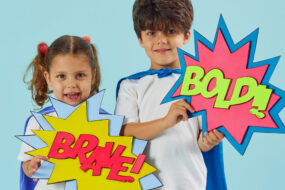How to talk to kids about racial equality
We live in an age where it’s hard to ignore the complex issues around race, racial identity and racism in our communities, schools, news and social media.
In one of Australia’s biggest surveys into racism and prejudice, Western Sydney University last year found one in five Aussies had experienced racism over a 12-month period.
It followed a 2009 survey of secondary students that found four out of five young people born in non-English-speaking countries were facing racism at school at least once a month.
If it’s tricky for adults to navigate issues like diversity and discrimination, what’s it like for kids?
And how do we deal with this sensitive topic in a way that helps our children become thoughtful, accepting and tolerant grownups?
The three-step approach
Dr Justin Coulson, parenting expert and the author of five books on raising kids, suggests a three-step approach if you have a child who is the victim of racism, has witnessed racial inequality, or just wants to chat about it.
“First, you need to explore exactly what has happened,” Dr Coulson says.
“Ask your child what they’ve observed or experienced and how they feel about it. It’s important to remember to be empathetic.”
Secondly, check for gaps: “By that I mean think about what your child is telling you and see if there’s room for them to be more tolerant or compassionate.
“It’s a good time for you to get a temperature check on how they think about things and to gently reinforce the message that bullying and intolerance isn’t acceptable under any circumstances.
The third step, advises Dr Coulson, a dad of six daughters, is to empower.
“Ask your child, what do you think is the best thing to do now? Let them make suggestions – work with them and prompt them with ideas where you feel it’s necessary.”
Kids are smarter than we think
Research shows children recognise differences in people at any early age and by age three or four have begun to show prejudice around traits like age, attractiveness, disability, gender and race.
“Kids need support to develop the sorts of skills – both cognitive and emotional – that will help them develop positive cultural attitudes and so they grow to be compassionate, courageous and empathetic,” Dr Coulson says.
“The end goal is to correct misconceptions, appeal to the humanity on every child and to help them articulate and express their ideas.”
The team at House of Wellness TV asked a group of parents and their children to sit down and talk through some of life’s most important topics, including gender equality, death, bullying, peer pressure and body image.
Watch what kids had to say about racial equality:






